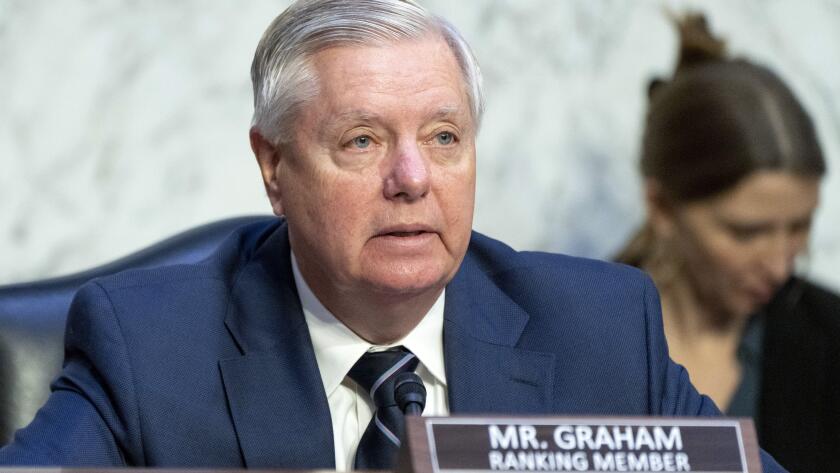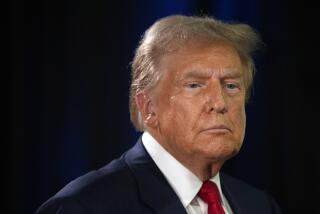Georgia grand jury recommended charging Sen. Lindsey Graham, 2 ex-senators, Michael Flynn
- Share via
The special grand jury in the investigation by the Georgia prosecutor who went on to indict Trump and 18 others had recommended charging many more people, some high-ranking.
- Share via
ATLANTA — The special grand jury that investigated efforts by Donald Trump and others to overturn Georgia’s 2020 election results recommended indictments against twice as many people as the 19 ultimately charged by prosecutors, leaving Republican Sen. Lindsey Graham of South Carolina among those not indicted.
The grand jurors’ report released Friday said they had recommended charges against 39 people, including Graham, former U.S. Sens. Kelly Loeffler and David Perdue of Georgia, and former Trump national security advisor Michael Flynn.
Released at the grand jury’s request, the report provides insight into one of the most expansive investigations into Trump, who is also facing two federal indictments along with unrelated state charges in New York City. While critics have accused Fulton County, Ga., Dist. Atty. Fani Willis of launching an unwieldy, overly broad case, the report suggests she used her discretion to streamline the case.
There are many reasons Willis might have chosen not to charge all of those recommended, including immunity deals with some, federal protections for others or insufficient evidence to prove charges beyond a reasonable doubt.
The special grand jury included Graham’s name in a section about “the national effort to overturn the 2020 presidential election,” which Republican incumbent Trump lost to Democrat Joe Biden. The senator, then-chair of the Senate Judiciary Committee, called Georgia Secretary of State Brad Raffensperger shortly after the November election; Raffensperger, a fellow Republican, has said Graham asked him whether he had the power to reject certain absentee ballots.
Then-Sens. Perdue and Loeffler, both Republicans, had failed to win enough votes in the November 2020 election and went on to lose to their Democratic challengers in January 2021 runoffs. In the weeks after the general election, they were vocal in their criticism of Raffensperger, even calling for his resignation.
In an interview on a right-wing cable news channel in December 2020, Flynn said Trump “could take military capabilities” to swing states and “basically rerun an election in each of those states.” He also traveled that November to conservative lawyer Lin Wood’s South Carolina home, where Wood has said meetings were held to discuss possible ways to influence election results in Georgia and elsewhere. The special grand jury also recommended charges against Wood.
Trump, the early front-runner in polls for the 2024 Republican presidential nomination, blasted the report on his Truth Social site, saying, “They wanted to indict anybody who happened to be breathing at the time.”
Graham, who has denied wrongdoing, said Friday, “It should never be a crime for a federal elected official, particularly the chairman of the Senate Judiciary Committee, who will have to vote to certify a presidential election, to question and ensure the integrity of that election.”
Loeffler, who has since founded and funded a Republican-aligned group called Greater Georgia, said Friday that she had only spoken up for people who felt disenfranchised in the 2020 election.
“Trying to jail your party’s leading political opponent ahead of 2024 is election interference. Speaking out in defense of election integrity is not,” she said on the social media site X, formerly Twitter.
Flynn pointed to his lawyer Jesse Binnall’s post on X: “General Michael Flynn will continue to fight for the truth, for America First principles, and for Donald Trump’s return to The White House in 2024.”
Wood, who spoke before the special grand jury after receiving a subpoena, said Friday that he had done nothing wrong.
“It seems unfair to me that I get smeared as someone that is recommended for indictment,” the lawyer said, “when the people with the power to look at the evidence and indict did not indict me.”
Representatives for Perdue didn’t immediately respond to a request for comment.
The special grand jury foreperson, Emily Kohrs, spoke of her experience in an interview with the Associated Press in February and in later interviews in other print and television news outlets. She said the panel had recommended multiple people be indicted but declined to name names, citing a judge’s decision not to release the full report at that time.
While Kohrs’ whirlwind media tour was attacked by Trump’s lawyers at the time and raised fears among some Trump critics that it could jeopardize the investigation, the judge overseeing the special grand jury made clear that grand jurors were free to talk about anything but their deliberations.
The panel spent seven months hearing from some 75 witnesses before completing a report in December with recommendations for Willis on charges.
The release of the identities of people recommended for indictment is a departure from ordinary grand jury protocol; normally, prosecutors do not disclose the names of those investigated but not charged, to prevent potentially innocent subjects from being unduly maligned.
Special grand juries are relatively uncommon in Georgia and are essentially an investigative tool. They can subpoena witnesses and evidence but do not have the power to bring indictments. Their recommendations for charges are not binding on a district attorney, who can then seek indictments from a regular grand jury.
The special grand jury’s report is based on the testimony of the witnesses prosecutors called and the evidence presented over about seven months last year. In their report, the grand jurors said their panel “contained no election law experts or criminal lawyers.”
Of the 19 people ultimately indicted, only one was not included in the special grand jury’s recommendations. A former White House aide directed Trump’s election day operations, Michael Roman, was charged with involvement in efforts to put forth a set of fake electors after the 2020 election.
Fulton County Superior Court Judge Robert McBurney ordered the partial release of the report in February, but declined then to release the grand jury’s recommendations on who should be prosecuted, saying he wanted to protect people’s due process rights.
McBurney said in a new order filed Aug. 28 that those concerns were now moot because a regular grand jury had indicted Trump and 18 others under the state’s racketeering law. All 19 have pleaded not guilty.
Many of those indicted — including former New York Mayor and Trump attorney Rudolph W. Giuliani and Trump White House chief of staff Mark Meadows — are known to have testified before the special grand jury. Trump was never called to testify.
The parts of the report released in February included its conclusions, as well as a section in which the grand jurors expressed concerns that one or more witnesses may have lied under oath, and urging prosecutors to seek charges for perjury.
More to Read
Get the L.A. Times Politics newsletter
Deeply reported insights into legislation, politics and policy from Sacramento, Washington and beyond. In your inbox three times per week.
You may occasionally receive promotional content from the Los Angeles Times.











